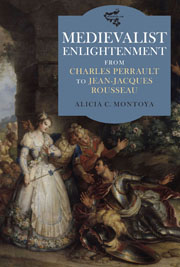Book contents
- Frontmatter
- Contents
- Dedication
- Acknowledgments
- Introduction
- I CONCEPTUALIZING THE MEDIEVAL
- II REIMAGINING THE MEDIEVAL
- 3 Survivals: Reading the Medieval Roman at the Dawn of the Enlightenment
- 4 Continuities: The Medieval as Performance
- 5 Reconfigurations: Medievalism and Desire, Between Eros and Agape
- III STUDYING THE MEDIEVAL
- Conclusion: Medievalism as an Alternative Modernity
- Bibliography
- Index
5 - Reconfigurations: Medievalism and Desire, Between Eros and Agape
from II - REIMAGINING THE MEDIEVAL
Published online by Cambridge University Press: 05 May 2013
- Frontmatter
- Contents
- Dedication
- Acknowledgments
- Introduction
- I CONCEPTUALIZING THE MEDIEVAL
- II REIMAGINING THE MEDIEVAL
- 3 Survivals: Reading the Medieval Roman at the Dawn of the Enlightenment
- 4 Continuities: The Medieval as Performance
- 5 Reconfigurations: Medievalism and Desire, Between Eros and Agape
- III STUDYING THE MEDIEVAL
- Conclusion: Medievalism as an Alternative Modernity
- Bibliography
- Index
Summary
Desire was a defining element in early Enlightenment medievalisms, I have argued, because these medievalisms often expressed their longing for the past in an erotic or sexualized language. Embodied, performative forms of knowledge represented one response to the desire to physically touch the past. The roman genre provided another response to this erotization of the past due to its association with illicit desire and its supposedly seductive, corrupting power. For late seventeenth- and early eighteenth-century authors, it was a cliché to think of the Middle Ages as a period characterized, above all, by the prominent place its literature assigned to love. Epitomized by the legendary Cours d'amour, immortalized in troubadour lyric, and remembered through the amorous quests that provided the backbone of chivalric narrative, earthly love was what summed up the medieval, more than anything else, in the popular imagination. “Lovers no longer love as in olden days” (On n'aime plus comme on aimoit jadis), sang Deshoulières in her famous ballad, echoed by the fairy tale author Charlotte Rose Caumont de La Force, who was only stating the obvious when she described the Middle Ages as “the time of the great passions”.
This perception had its basis in developments that can be traced back to the historical Middle Ages, and especially the literary-philosophical flowering that began in the twelfth century and was marked by an unprecedented new debate on the nature of love. Crucially, this reflection took place both in a worldly and in a theological context, bringing together views that, at first sight, appeared incompatible – yet which some scholars have related to one another in various ways.
- Type
- Chapter
- Information
- Medievalist EnlightenmentFrom Charles Perrault to Jean-Jacques Rousseau, pp. 145 - 182Publisher: Boydell & BrewerPrint publication year: 2013



